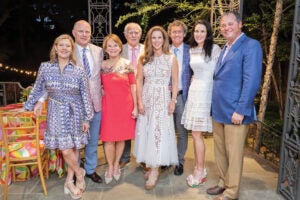The Harry Ransom Humanities Research Center at The University of Texas at Austin has acquired a rare Plantin Polyglot Bible, containing parallel texts in Hebrew, Greek, Syriac and Aramaic with translations and commentary in Latin.
The acquisition of this eight-volume folio was made possible by a major gift from Margaret Hight and an important contribution from Lucy Ross. Additional support came from the Ransom Center’s Carl H. Pforzheimer Endowment.
The Plantin Polyglot Bible will be displayed in the Ransom Center’s lobby from Tuesday, April 29, through Sunday, May 4. A slideshow of images from the Bible are also available online.
“The Plantin Polyglot Bible is the Ransom Center’s single most important rare book acquisition in the past two decades,” said Ransom Center Director Thomas F. Staley. “Although the Bible is internationally valued as a rare book, we are just as delighted about its scholarly significance in multiple disciplines and how it complements the Center’s collections.”
Printed in Antwerp between 1568 and 1572, Christopher Plantin’s Polyglot Bible is recognized for its contributions to philological and Biblical scholarship and the printing arts.
The Plantin Polyglot Bible joins a sizable collection of Bibles at the Ransom Center, including one of the 48 surviving copies of the Gutenberg Bible, a 1476 Jenson illuminated Bible on vellum, several copies of the original King James Version of the Bible and two Coverdale Bibles, the first complete English translation of the Bible.
“The Plantin Polyglot Bible was the most notable gap in our collection of post-1500 Bibles,” said Ransom Center Associate Director and Hobby Foundation Librarian Richard Oram. “We are extremely fortunate in being able to acquire a nearly complete set–lacking only the last volume of the apparatus–in an original binding. The condition of this Bible is extraordinary.”
Printing the Plantin Polyglot Bible was an enormous undertaking, requiring impeccable scholarship, considerable financing and a publisher capable of negotiating the religious and political issues of Reformation Europe.
Plantin employed more than 40 printers to complete the Bible by 1572 and many of the original 1,200 copies were lost in a shipwreck enroute to Spain.
A handful of copies of the Plantin Polyglot Bible are found today in European and American libraries.
High-resolution press images of the Plantin Polyglot Bible are available.





